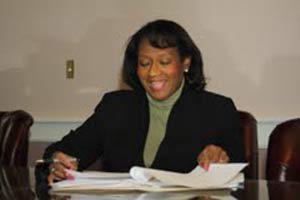By Carlton Koonce
NCCU Staff Writer
the Durham VOICE
thedurhamvoice@gmail.com
Classes will soon be in session for city and county residents wishing to learn more about the ins and outs of Durham government while becoming increasingly active leaders in the community. The Durham Neighborhood College program’s first class will begin on Thursday, Feb. 18, in the Durham County Government Complex at 6 p.m.

Deborah Craig-Ray, assistant Durham County manager, reviews applications for the Durham Neighborhood College. (Staff photo by Willie Pace)
The classes cover topics such as Durham city and county services, budget procedures and community development and are conducted by a variety of local government officials. Citizens from the community apply for acceptance to the sessions.
Deborah Craig-Ray, assistant Durham County manager, is probably the expert on the Neighborhood College. She manages intergovernmental relations including state and federal government within Durham and also reviews the applications to decide who is accepted.
According to Craig-Ray, the idea for the Neighborhood College was raised by citizens and elected officials and was first launched in the fall of 2003.
“The program provides an opportunity for citizens to get behind the scenes of local government. If they’re eligible, they’re accepted,” explained Craig-Ray. “Once I get a clearance from the tax department I can clear them.”
Applicants must be citizens or high school students age 15 or older living within the city or county of Durham and must be current on their vehicle and property taxes to be considered for one of the 25 available seats. The applications ask basic demographic questions to ensure diversity.
“We want the classes to reflect the demographics,” said Craig-Ray. “Most classes have a few Hispanic and Asian members and we can get a translator if needed, but we have had no need because all of them have been bilingual.”
Craig-Ray said anyone can sign up for the program and about 80 percent of graduates have lived within the city limits.
“We don’t get a lot of input from outside the city limits or Northeast Central Durham,” said Craig-Ray, who added that she would like to see more residents from both areas.
There is a $30 registration fee, but Craig-Ray said she is permitted to grant up to five waivers for those who need it.
“A couple of years ago we had three high school students in one class that were friends,” said Craig-Ray. “Every third class or so we have a younger person in and we have lots of NCCU and Duke students in the classes.”
Dawn Dudley is a public information specialist for Durham County and helps Craig-Ray review applications. She said some NCCU students say they hear about the Neighborhood College through class.
“We’ve seen a slowdown in the amount of applications coming through,” said Dudley. “We had 49 people apply last time, a majority of which were men. That is rare.”
Craig-Ray said there is no paid advertising so news about the program gets around mainly through word of mouth. Interviews of past students air on channel 8 during a program titled “In Touch with Durham County.”
The Durham Neighborhood College is budgeted $10,000 annually split by each government unit. The funds are used for advertising, certificates, the light food served prior to class, and necessary supplies.
According to Craig-Ray, the first four classes are held in the Durham County Government Complex with the remainder taking place at the City of Durham Training building. Citizens are asked to complete 8 out of 10 of the classes in order to pass.
“Some people have to miss a class now and then so they are allowed to make one up during the next session if they miss one,” said Craig-Ray.
The final day of class includes a tour of city and county facilities and projects, such as redeveloped neighborhoods, followed by graduation at the Holton Center.
“City council member Mike Woodard was in the second class,” said Craig-Ray. “Others [graduates] have run for school board seats or city council, but they didn’t win.”
Craig-Ray said sometimes Neighborhood College graduates are chosen for city and county commissions, such as the Environmental Affairs Board, the Criminal Justice Partnership advisory board, and the Open Space and Trails Commission.
Craig-Ray said last fall’s session was probably the last time the program will be offered in the fall, and it may only be held in the spring from now on. A 2005 PowerPoint presentation by Craig-Ray concerning the Durham Neighborhood College concludes with a statement that citizens informed of their local government are a benefit to the community.
“People give back by going through the program,” said Craig-Ray. “People are able to work more effectively in the neighborhood.”
Program Agenda:
Press Release:
http://www.co.durham.nc.us/departments/publ/News_Releases/News_Release.cfm?ID=1214